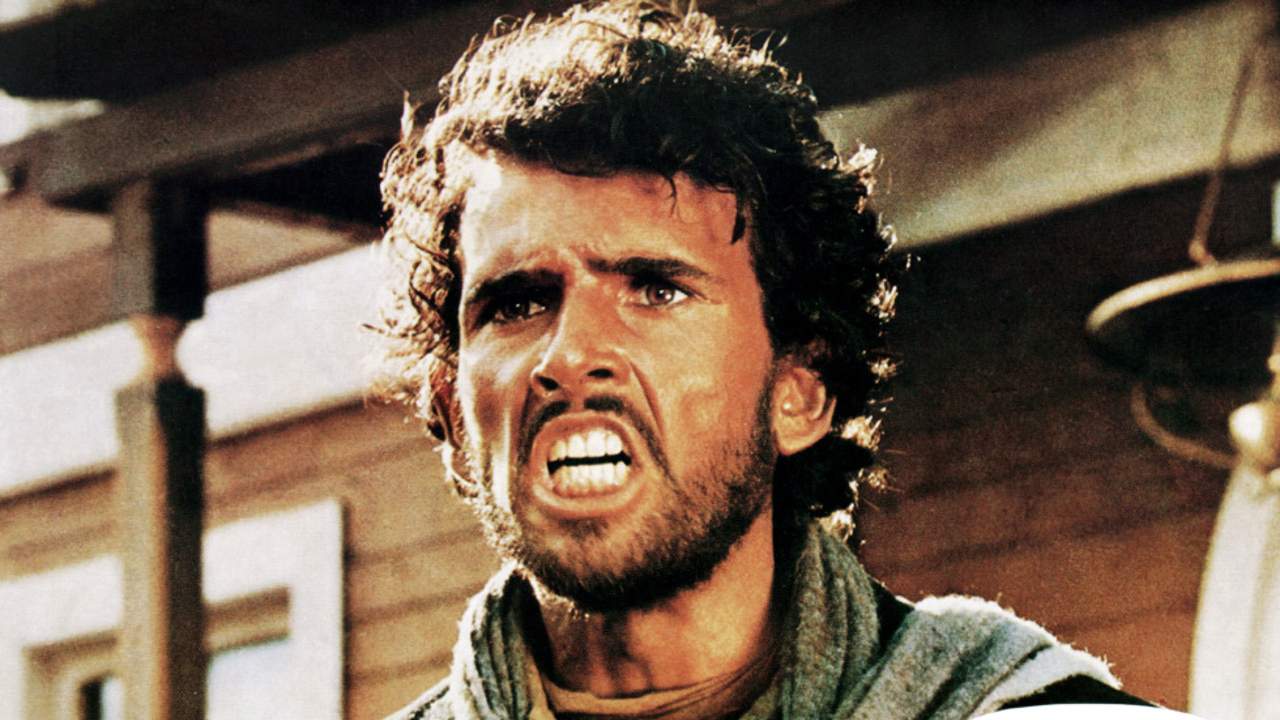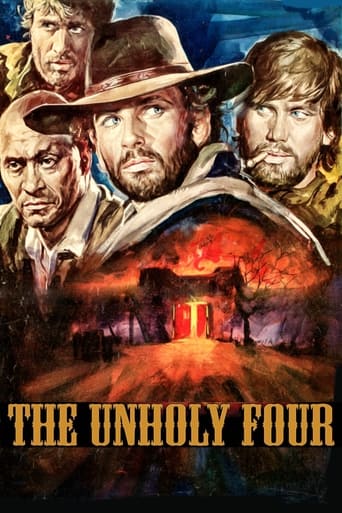

Enzo Barboni (as E. B. Clutcher no less) was catapulted to fame and the top of the Italian box office (which he wrested away from Sergio Leone's A Fistful of Dollars) that same year with the first Trinity film. That Trinity is a household classic of sorts across Europe, most people have seen it growing up in a Sunday afternoon TV showing, while The Unholy Four is obscure even by spaghetti standards, says a lot not about the quality of either movie, because both are well made, both tap into different parts of a western mythos for inspiration (the land, the people, the violence) while essentially they speak about very Italian things, things that Italian movie-going audiences can connect in a very immediate sense because a wild barroom fistfight is a fistfight in any language and unshaven people wolf down a pot of beans the same way in Naples and Texas; no, the different status says more about the different pulls within the spaghetti western genre by the crucial turning point of 1970 and the western paying audiences validated with their ticket money. On one hand the silly slapstick farce that kicks down the mythic a peg or two for good measure, on the other hand something a little more ambitious..That's not to say The Unholy Four poses grand moral dilemmas, it don't, and the emphasis is once again on ostentatious cameras gliding around set pieces of frontier violence, on fistfights energetically filmed, on the ugly and the grotesque, the funny and picaresque, poking fun at coward priests and incompetent bank guards alike (again things the Italians had a soft spot for). But at some point amnesiac Leonard Mann (playing Chuck Moll or Django depending on the print you see) is taken in as the lost son by the bitter enemy of his father and turned loose against him, he's introduced to his love interest who thought him long dead as her brother and can't remember a thing anymore than she's allowed to remind him, so there's something burning there that remains unrequited and there's a breakdown in communication that is very literal yet still terrifying. And then his real father takes him in as his real son, long presumed dead, and turns him against his bitter enemy, and he acquiesces to that too, who probably couldn't tell the difference between the real or fake fathers so that he becomes, not just a pawn at some trivial game of vendetta that will be forgotten by all the moment they all hit the ground, but a ghost of his real self exiled from the world because he can't tell real from imagined, right from wrong, so there's no place for him there. And then the movie twists again to reveal his true identity, after a long shootout in a dusty town that seems like the same set used in movies like Keoma, filmed with rapid cuts and long tracking shots around alcoves and across balconies and great in-depth staging; while one reloads his pistol in the frontground, another one is getting shot through the floor in the background.The movie never really establishes itself as a "thinking man's western", but at the same time there's something that hints at deeper meaningful things here. Enzo Barboni was probably not the man to bring them to the surface, like most Italians genre directors he never *really* cared to probe deep at identity themes, but this needs to be seen by more people.
... View MoreAmnesiac Leonard Mann escapes from a sanitarium with fellow inmates Woody Strode, George Eastman, and Peter Martell. The four make their way to a town where Mann's father and angry brother are feuding with vicious rivals that try to use him and his state of amnesia for their own benefit.This re-teaming of Mann and Martell (after The Forgotten Pistolero) has an intriguing premise and a slew of familiar faces, but takes way too much time for things to heat up. Everyone involved has definitely done better.That being said, this isn't bad. The four leads have great chemistry and keep things fairly interesting. The direction by E.B. Clutcher (best known for They Call Me Trinity and it's sequel) is adequate enough and the final thirty minutes fairly good.The actress that plays Mann's love interest here, previously played his mother!
... View MoreE.B. Clucher is the pseudonym of Enzio Carboni. He is the director responsible for the Trinity westerns featuring Terence Hill. This spaghetti western is a notch above most of the Italian run of the mill flicks. It has a decent plot that does away with the pitfalls of most ordinary revenge westerns. The characters that befriend Ciakmull are a bunch of escaped looneys and their antics heighten the entertainment value a lot. The silly duel myth is kept alive here but when the bullets start flying the spectators are treated to spectacular and inspired camerawork. In genre films it is always nice to be treated to a familiar face to give the product some, often much needed, touch of class. In this film that honor lies with John Ford regular Woody Strode. This excellent athlete turned actor plays a simple but loyal and brave buddy to the bewildered hero. One cannot say there is one single original idea in this spaghetti gunfest, but when served up hot and spicy like this it's sheer pleasure to watch.
... View MoreStarting with the very first scene, this flawed masterpiece of pastaland gunslingin' grabs your attention and keeps it locked in until the final, intricately choreographed shootout.When some bank robbers set fire to the local nut-house to create a diversion, four inmates manage to escape and take in on the run. One is an amnesiac who is searching for his identity and in the process the four find themselves on the trail of the bank robbers. The trail leads to a town where Chuck Mool's family is located, but who are they? And why is everyone in town deathly afraid of him?The plot outline may not sound like much but this top-notch spag is excellently made with great camerawork, a well written script, exciting, intricately choreographed action and hell, even the costumes and sets are done with style.It's not just plot that makes a classic spag, but character bits, atmosphere and action, and this one's got it in spades. One of the more amusing character moments is when Eastman finds Strode in the local church cheerfully playing the organ and singing hymns while an exhausted preacher, in fear of his life, is madly pumping the instrument.From blazing infernos and barroom brawls to cat n' mouse gunfights in dark cemeteries this one is a winner from the first frame. Too bad nobody seems to know about it.
... View More